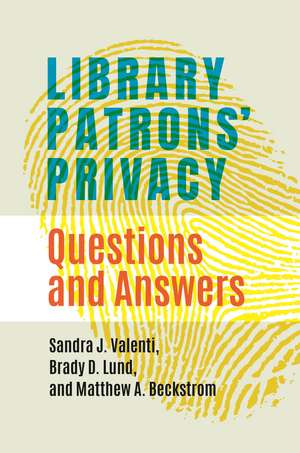Library Patrons' Privacy: Questions and Answers
Autor Sandra J. Valenti, Brady D. Lund, Matthew A. Beckstromen Limba Engleză Paperback – 10 ian 2022 – vârsta până la 17 ani
Preț: 341.89 lei
Preț vechi: 443.63 lei
-23% Nou
Puncte Express: 513
Preț estimativ în valută:
65.43€ • 68.13$ • 55.30£
65.43€ • 68.13$ • 55.30£
Carte tipărită la comandă
Livrare economică 10-24 martie
Preluare comenzi: 021 569.72.76
Specificații
ISBN-13: 9781440874109
ISBN-10: 1440874107
Pagini: 168
Dimensiuni: 156 x 235 x 12 mm
Greutate: 0.57 kg
Editura: Bloomsbury Publishing
Colecția Libraries Unlimited
Locul publicării:New York, United States
ISBN-10: 1440874107
Pagini: 168
Dimensiuni: 156 x 235 x 12 mm
Greutate: 0.57 kg
Editura: Bloomsbury Publishing
Colecția Libraries Unlimited
Locul publicării:New York, United States
Caracteristici
Provides students and practitioners with a foundation of practical problem-solving strategies for handling information privacy issues in emerging technologies
Notă biografică
Sandra J. Valenti is assistant professor in the School of Library and Information Management at Emporia State University.Brady D. Lund is a doctoral student in the School of Library and Information Management at Emporia State University.Matthew A. Beckstrom is systems manager/librarian at the Lewis and Clark Library in Helena, MT.
Cuprins
AcknowledgmentsIntroduction: The Importance of Evidence-Based Practice in Information PolicyPart IGetting Our Boots on the Ground: The Dirty Work of Patron Privacy1ONEMissing/Unattended Items in the LibraryTWOPatron Records and the Anonymous CheckoutTHREEPhotography and Video Recording within the Library and Social Media PolicyFOURWhen Escalation Must Result in Calling the PolicePart IILibraries and Basic Computer Privacy63FIVELooking over Your Shoulder (Literally and Figuratively)SIXPrivacy and Security in the Virtual Library EnvironmentPart IIIEmerging Technologies: Where Are We Going (and What Should We Do about It)?87SEVENTracking Your Web UseEIGHTHow Public Computer Network Usage May Pose a ThreatNINELetting Your Library Get Stuck in the Dark WebGlossary139Additional ResourcesIndex
Recenzii
A superb starting point that emphasizes the importance of library policies while simultaneously showing that policies cannot render the final solution when privacy issues arise.
Library employees involved in the planning, implementation, support, and evaluation of measures to protect patrons' privacy and confidentiality will find this resource particularly useful.
An excellent introduction to patron privacy issues with current and emerging technologies and how all types of libraries can address them. I enjoyed the case study approach of each chapter, which identifies the key aspects and questions to ask in each privacy situation. The authors give library staff the tools they need to proactively protect their patrons' privacy by learning from the experiences, research, and policy implementations of other librarians.
Library employees involved in the planning, implementation, support, and evaluation of measures to protect patrons' privacy and confidentiality will find this resource particularly useful.
An excellent introduction to patron privacy issues with current and emerging technologies and how all types of libraries can address them. I enjoyed the case study approach of each chapter, which identifies the key aspects and questions to ask in each privacy situation. The authors give library staff the tools they need to proactively protect their patrons' privacy by learning from the experiences, research, and policy implementations of other librarians.
